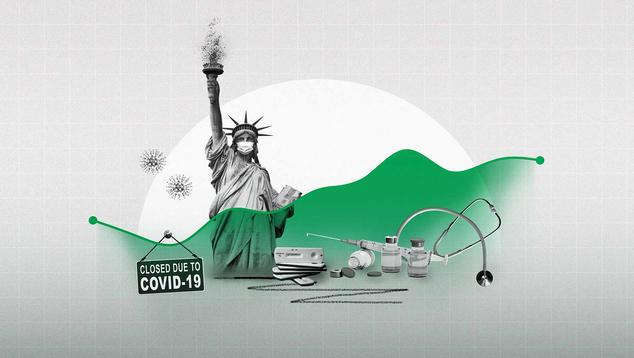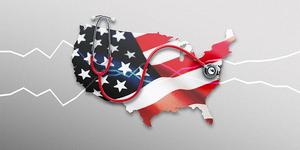Story Highlights
- 47% say life back to normal; 13% expect eventual full recovery, 40% do not
- 46% have received COVID-19 vaccine in past six months, 5% more plan to
- 28% say they have never been infected; 11% have had Long COVID
WASHINGTON, D.C. -- Five years after the start of the COVID-19 pandemic forced nationwide closures of businesses and schools in the U.S., a steady three in five Americans say the pandemic is over, while almost as many worry that there will be another global pandemic in their lifetime. Nearly half of U.S. adults, 47%, report that their life is completely back to the normal that existed before the pandemic, while 13% expect to eventually return to pre-pandemic normalcy and 40% think life will never get back to normal.
More than seven in 10 U.S. adults, 72%, report having contracted COVID-19 at some point since 2020, while 28% say they have never had it. Sixteen percent of Americans say they have tested positive without having any symptoms, 11% have experienced Long COVID symptoms, and 2% have been admitted to the hospital.
When it comes to their current feelings about catching COVID-19, one in five Americans continue to say they are worried, but relatively few say they are wearing a mask regularly. About half of U.S. adults say they have received a COVID-19 vaccine in the past six months or plan to get one soon.
These findings are from a Feb. 18-26 update to Gallup's probability-based COVID-19 web panel tracking poll, which began in March 2020.
Majorities Say Pandemic Is Over, but Normalcy Still Elusive
A majority of Americans, 59%, now think the pandemic is over, but 41% think it is not. These readings are unchanged from Gallup’s last update one year ago.
Gallup has tracked Americans’ perceptions of whether the pandemic is over in the U.S. since June 2021, during the COVID-19 vaccine rollout. In late May/early June 2023 -- after President Joe Biden signed a congressional resolution to end the nation’s state of emergency and the U.S. and global public health emergency declarations ended -- a majority (64%) said the pandemic was over. Fewer, though still a slim 53% majority, continued to believe it had ended in late August/early September 2023.
As has been the case since Gallup’s first reading in 2021, Republicans are more likely than independents and Democrats to say the pandemic is over. Currently, 79% of Republicans, 61% of independents and 43% of Democrats think the pandemic has ended. These readings are on par with last year’s.
Although a majority of Americans think the pandemic is over, less than half, 47%, report that their life is completely back to normal. Another 13% say their life has not yet returned to pre-pandemic normalcy but expect it will, while 40% do not anticipate it ever getting back to normal. Over the past year, Americans’ reports of a return to normalcy have edged up four percentage points to a new high in this trend that began in 2021.
Republicans (58%) are more likely than Democrats (42%) and independents (45%) to say their life is back to normal. Nearly half of Democrats (46%), 41% of independents and 29% of Republicans say their life will never be normal again. Similarly small shares of each group expect normalcy to eventually return.
Majority Worry About Another Pandemic; Few Worry About Catching COVID-19
A majority of U.S. adults, 58%, are worried that there will be another global pandemic in their lifetime, including 16% who are “very worried” and 42% “somewhat worried.” Another 26% of Americans are “not too worried,” and 15% are “not worried at all.”
Partisans’ concerns about another global pandemic diverge sharply, as majorities of Democrats (78%) and independents (57%) say they are at least somewhat worried, compared with 34% of Republicans. Twenty-nine percent of Republicans are not worried at all about a future pandemic, and 37% are not too worried.
Meanwhile, Americans’ current worry about getting COVID-19 is essentially unchanged from one year ago, as 21% say they are very (3%) or somewhat (18%) worried. Forty percent are not worried at all, and 39% are not too worried.
Concern about getting COVID-19 was highest in the first year of the pandemic, before the vaccine was rolled out. U.S. adults’ worry averaged 53% between April and November 2020. The lowest point in worry about contracting the virus was 17% in June 2021, after a majority of U.S. adults had received a COVID-19 shot. Worry then increased as new variants of the disease spread in 2021 and 2022, but it has since come down.
Worry about contracting COVID-19 remains highest among Democrats and some largely Democratic groups such as women, people of color and city residents. The 29% of Democrats who now say they are worried about getting the virus compares with 9% of Republicans and 21% of independents.
Five percent of U.S. adults say they “always” or “very often” wear a mask outside their home, and 13% do so “sometimes.” Twenty-eight percent “rarely” wear a mask, and 54% “never” do. Those who have worn a mask are most likely to say they have done so to avoid COVID-19 infection -- including those who say they are immunocompromised (22%) and those who say they are not (36%). Another 10% say they have worn a mask to follow CDC guidelines after having COVID-19, and 33% say they’ve worn a mask for reasons not related to COVID-19.
Americans’ Current Vaccination Status Largely Dependent on Party ID
Just over half of U.S. adults say they have received a COVID-19 vaccination in the past six months (46%) or plan to do so (5%), while 49% say they have not gotten the latest shot. Vaccination status is much higher among Democrats (66%) than Republicans (24%), older adults (58%) than younger adults (43%), and college graduates (55%) than those without a college degree (42%).
Americans are slightly more likely to report that they have received an annual flu shot than a COVID-19 shot (51% vs. 46%, respectively). This pattern is seen particularly among Republicans (among whom 38% have received a flu shot) and older adults (71%).
Those who have not recently been vaccinated against COVID-19 were asked to choose the main reason for not getting the shot. Twenty-one percent express concerns about the safety of the shot, while slightly smaller percentages say they do not believe it is effective (16%), believe they already have antibodies from the virus (16%), plan to get it but have not yet done so (16%), or do not think they would face serious health effects from COVID-19 (15%). Fewer say they don’t trust vaccines in general (8%) or are concerned about reacting to the shot (7%).
Personal Experiences With COVID-19 Differ
Americans’ personal experiences with COVID-19 over the past five years are quite varied:
- Seventy-two percent of U.S. adults say they have had, or suspected they have had, COVID-19 at least once in the past five years. That leaves 28% of U.S. adults saying they have never had COVID-19.
- Americans aged 65 and older are the most likely to say they have not had COVID-19 (39%), which may be the result of them taking extra precautions, as evidenced by their much higher vaccination rates. Fewer young (21%) and middle-aged (26%) adults report that they have been unscathed so far. Partisans report similar infection rates, despite differences in their vaccination status.
- Sixteen percent of Americans report having tested positive for COVID-19 but being asymptomatic.
- Eleven percent of U.S. adults say they developed Long COVID, with symptoms that persisted for three months or more.
- Two percent of Americans say they were admitted to the hospital because of a COVID-19 infection.
Bottom Line
Five years after the COVID-19 pandemic caused an unprecedented shutdown in modern U.S. society, a majority of Americans say the pandemic is over. However, 40% of U.S. adults say their life is not yet back to normal and never will be. About six in 10 Americans are worried about another global pandemic in the future.
Views remain politically polarized, as Democrats are more likely than Republicans to say the pandemic is ongoing and that their life is still disrupted as a result. Democrats are also far more worried than Republicans about another global pandemic occurring in their lifetime.
Party gaps are also seen in U.S. adults’ vaccination status, with far more Democrats than Republicans saying they have received a COVID-19 shot in the past six months.
To stay up to date with the latest Gallup News insights and updates, follow us on X @Gallup.
Learn more about how the Gallup Panel works.




